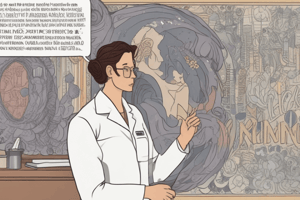Podcast
Questions and Answers
What is the primary ethical issue related to a patient's right to make decisions in research?
What is the primary ethical issue related to a patient's right to make decisions in research?
- Anonymity
- Informed consent (correct)
- Beneficence
- Vulnerable populations
Which of the following best describes the concept of beneficence in research?
Which of the following best describes the concept of beneficence in research?
- Guaranteeing that participant identities are kept secret
- Ensuring participants feel comfortable sharing information
- Maximizing benefits while minimizing risks (correct)
- Obtaining consent for financial compensation
When conducting research, what must a researcher do if anonymity cannot be guaranteed?
When conducting research, what must a researcher do if anonymity cannot be guaranteed?
- Only use data from anonymous sources
- Ensure all data is public and accessible
- Address confidentiality to protect private information (correct)
- Limit the study to non-sensitive topics
What ethical consideration is particularly important when working with vulnerable groups in research?
What ethical consideration is particularly important when working with vulnerable groups in research?
Which of the following best encapsulates the nature of nursing ethics in research?
Which of the following best encapsulates the nature of nursing ethics in research?
What is the primary responsibility of MDs and RNs regarding patient consent?
What is the primary responsibility of MDs and RNs regarding patient consent?
Which article emphasizes the confidentiality of a user's medical record?
Which article emphasizes the confidentiality of a user's medical record?
What is the obligation of means as it pertains to medical professionals?
What is the obligation of means as it pertains to medical professionals?
Which right ensures that a patient can be accompanied during their care?
Which right ensures that a patient can be accompanied during their care?
What is essential for nurses to provide for patient comprehension?
What is essential for nurses to provide for patient comprehension?
What does conscientious objection entail in a healthcare context?
What does conscientious objection entail in a healthcare context?
Which of the following is NOT governed by Canadian law in relation to nursing practice?
Which of the following is NOT governed by Canadian law in relation to nursing practice?
Which of the following legal aspects is connected to the topic of death and dying?
Which of the following legal aspects is connected to the topic of death and dying?
What constitutes negligence in a legal context?
What constitutes negligence in a legal context?
In what situation might nurses be held legally liable?
In what situation might nurses be held legally liable?
Which of the following is NOT part of the legal framework surrounding death and dying?
Which of the following is NOT part of the legal framework surrounding death and dying?
What is emphasized by Canadian law regarding nursing practice?
What is emphasized by Canadian law regarding nursing practice?
What is a critical requirement for ensuring privacy in healthcare?
What is a critical requirement for ensuring privacy in healthcare?
What is one of the primary reasons P is liable for D's injuries?
What is one of the primary reasons P is liable for D's injuries?
Under what condition is informed consent not required in medical emergencies?
Under what condition is informed consent not required in medical emergencies?
Which of the following best describes the general principle regarding patient consent?
Which of the following best describes the general principle regarding patient consent?
What should be included in an information sheet given to patients?
What should be included in an information sheet given to patients?
What happens when consent is deemed invalid?
What happens when consent is deemed invalid?
How does P's understanding of the risks impact his responsibility?
How does P's understanding of the risks impact his responsibility?
Which of the following is NOT a criterion in the 3-tier test published by the College de Médecins?
Which of the following is NOT a criterion in the 3-tier test published by the College de Médecins?
What was the initial diagnosis made by P for D's pain after the operation?
What was the initial diagnosis made by P for D's pain after the operation?
What is moral distress?
What is moral distress?
What differentiates moral agency from moral distress?
What differentiates moral agency from moral distress?
Which of the following actions can help address moral distress for nurses?
Which of the following actions can help address moral distress for nurses?
What constitutes moral courage?
What constitutes moral courage?
What characterizes a moral community in the workplace?
What characterizes a moral community in the workplace?
How can one develop ethical competence in nursing?
How can one develop ethical competence in nursing?
What is the significance of reconnecting to the original intention of being a nurse?
What is the significance of reconnecting to the original intention of being a nurse?
What is the difference between moral distress and moral uncertainty?
What is the difference between moral distress and moral uncertainty?
Flashcards are hidden until you start studying
Study Notes
Ethical Considerations In Nursing Research
- Nurses navigate three value systems when engaging in research: societal focus on human rights, nursing ethics, and scientific inquiry.
- Informed consent is crucial for safeguarding patient autonomy and involves thorough information dissemination about the study, procedures, potential risks and benefits, compensation, and alternative options.
- Beneficence emphasizes the potential benefits of participation, while nonmaleficence considers potential risks.
- Anonymity ensures subject identity remains unknown, while confidentiality protects the management of private information.
- Privacy is respected by protecting sensitive information.
- Ethical considerations are crucial when using vulnerable populations and ensuring their informed consent.
- Researchers must transparently disclose any limitations in their knowledge and skills relevant to the research.
- The ethical implications of the nursing profession are paramount: considering the meaning of care, and following professional ethical codes.
Moral Distress in Nursing
- Moral distress occurs when nurses are aware of the correct action in a situation but are unable to act due to institutional or hierarchical constraints.
- Moral distress manifests as psychological disequilibrium and negative feelings when actions don't align with moral decisions. It differs from moral uncertainty, where the right course of action is unclear.
- It can signal a conflict between a nurse's professional conscience and an environment that inhibits ethical practice.
From Moral Distress to Moral Agency
- Agency refers to an individual's capacity to engage in deliberate action.
- Moral agency strengthens the understanding of the moral dimension of clinical practice by recognizing a person's ability to engage in deliberate and morally relevant actions.
- All nurses are considered moral agents.
Addressing Moral Distress
- Nurses can address moral distress by recognizing symptoms, engaging in reflection, reconnecting to their original purpose and nursing intention, prioritizing personal well-being, supporting and restoring moral integrity, developing ethical competence, learning to listen to intuition and somatic responses, speaking up, taking action, and contributing to a culture of ethical practice.
Moral Courage and Resilience
- Moral courage embodies the expression of moral agency.
- Moral resilience refers to the capacity to maintain or restore integrity in response to moral complexity, confusion, or setbacks.
- A moral community fosters shared values, directs ethical action, and encourages open communication.
Canadian Law and Nursing Practice
- Each province and territory has its own nursing regulatory body that establishes and enforces standards of practice, professional conduct, and licensure requirements.
- Canadian law dictates licensure and certification requirements, defines the scope of nursing practice, governs the protection of patient privacy, mandates informed consent, requires reporting of certain incidents like suspected abuse, emphasizes cultural competence, regulates controlled substances, addresses end-of-life care, and prohibits discrimination.
Legal Framework Related to Death and Dying
- Legal frameworks relevant to death and dying include MAID (Medical Assistance in Dying), advance care planning, DNR orders, palliative care, privacy regulations, informed consent, funeral and burial laws, estate planning, wills, and consent for autopsy.
Negligence and Legal Liability
- Negligence is a legal concept that encompasses the failure to exercise the level of care and caution that a reasonable person would under similar circumstances. It involves breach of duty, causation, and harm.
- Nurses can be held legally liable for their actions in cases of medical malpractice, negligence, breach of confidentiality, and other professional misconduct.
Patient Rights in Canada
- The Act Respecting Health Services and Social Services (AHSSS) outlines patient rights, including continuity and safety of services, choice of medical professionals, informed decision-making, accompaniment by a person of choice, receipt of services in English, and access to services within the material limits of the institution.
- These rights are reflected in other legislative texts, such as the Code of Ethics of Nurses and the Civil Code of Quebec.
Professional Obligations
- Medical doctors and registered nurses have a duty to inform patients and obtain free and enlightened consent, provide accurate diagnoses, treat patients, follow up with them, and maintain professional confidentiality.
- They have an obligation of means, meaning they are obligated to provide care and use their skills and knowledge to the best of their abilities, but not to guarantee a specific outcome.
Informed Consent
- Generally, all patients must provide informed consent before receiving care.
- The exception is in emergencies, where immediate action is necessary to protect life or health.
- Even in emergencies, consent is still required if unusual care is needed or the intervention could have intolerable consequences.
- Consent is invalid when given out of fear or based on misrepresentation.
- Consent must be given freely and knowingly by a person capable of making their own decisions.
Studying That Suits You
Use AI to generate personalized quizzes and flashcards to suit your learning preferences.




